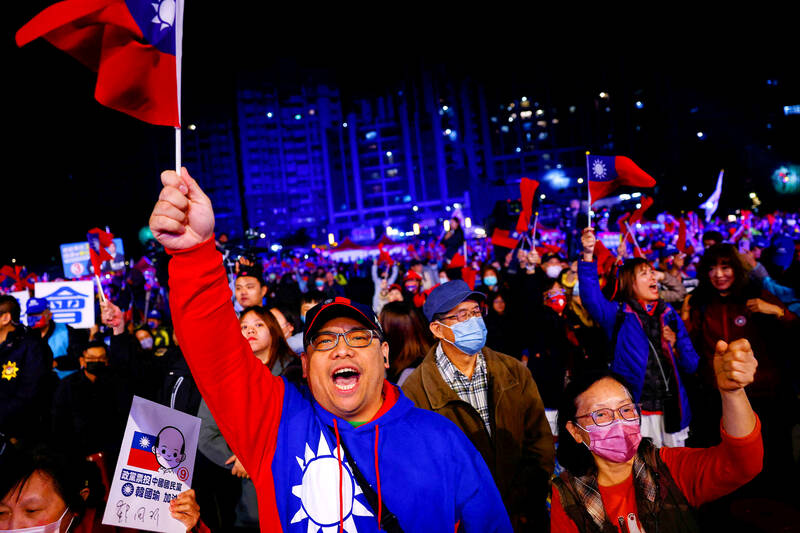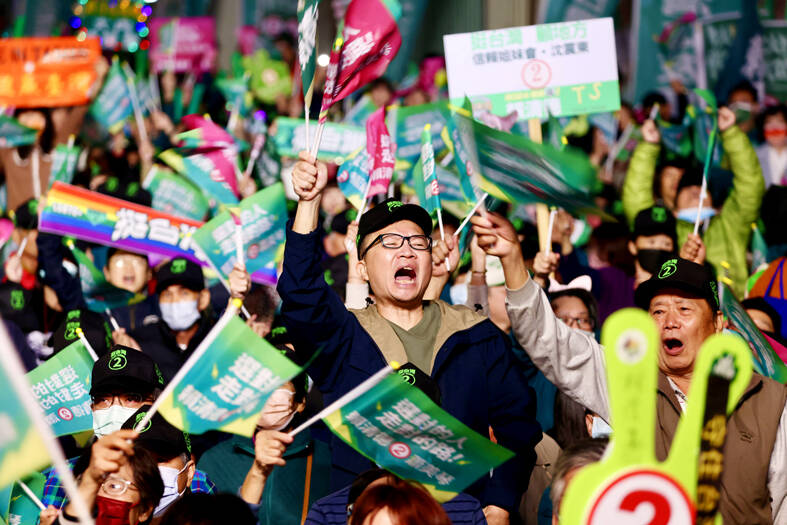In the run-up to the recent election we were treated to an unchecked flow of commentary about the young, their concerns and how they had shifting views of the ruling party. How they yearned for change. The young make great interview subjects, being earnest, physically attractive and competent in English. If only commentators had spent more time talking to cranky people over 50 who owned real estate assets, we might have a better understanding of what happened in the recent election. Instead, we got a comprehensive picture of a minority voter cohort with tens of thousands of constituents working outside Taiwan. At least they were cute.
One of the many ironies of this election is how the Chinese Nationalist Party (KMT), an utter failure as an opposition party, nevertheless expanded its representation in the legislature, as it had in the previous legislative election. The KMT offered no positive vision of the future to counter the Democratic Progressive Party’s (DPP) Taiwan-centered ideals. It has never acted as a responsible opposition. Indeed, commentators who argue that we need the KMT because we need an opposition in a democracy misunderstand the its function in politics. Instead, as longtime observer Michael Fahey noted on Twitter, the KMT returned to its past, adding seats for the scions of landed families and gangsters, sweeping away far more progressive candidates in traditionally pro-KMT areas.
DPP: THE REAL STATUS QUO

Photo: Reuters
It was obvious to many observers that Taiwan People’s Party (TPP) Chairman and presidential candidate Ko Wen-je (柯文哲), whose Internet game was head and shoulders above the other candidates’, hurt the DPP more than the KMT. I expect analyses will show roughly two-thirds of his vote came from those typically sympathetic to the DPP. Because the DPP’s presidential candidate William Lai (賴清德) lead all reliable polls throughout the election, some longtime DPP voters felt safe signaling their fatigue with the party by voting for Ko, since Lai was bound to win anyway. Ko’s outstanding showing in the big rally on Thursday night before the election also helped convince this group that Ko’s base would stick to him, and that their vote would not be wasted.
It can only be hoped that when these voters woke up on Monday and saw Ko and his followers promoting the idea that the election was rigged somehow, they reconsidered. Yep, Ko apparently believed his own party’s internal polls. Reports have it the Central Election Commission (CEC) is considering lawsuits against some of his supporters.
What kind of government was the result? The voters gave us the government they needed, if they did not want to see change in the current developmentalist, property-driven economic growth paradigm, with low wages, long working hours, cheap money, high worker productivity relative to salaries, and high property prices. The DPP has managed to push up incomes a bit, though inflation killed those gains. Not much else has changed.

Photo: AP
WEALTH DIVIDE DRIVES YOUTH
This election was shaped not by younger voters’ demands for change, but by the generational wealth divide.
The young see this economy and conclude it offers them nothing for the future, but anyone who has talked to people over 50 has heard them laugh at the young for being losers. Older voters reap the benefits of the current economy — wealth gains since 2000 have largely gone to older people with property. They do not want change, and they signaled that emphatically with this election. They gave the DPP a 40 percent presidential vote to keep out the PRC — think what an invasion would do to property prices! — but they gave the DPP only 36 percent of the party vote (33 percent in 2020), indicating a deliberate attempt to split the legislature.

Photo: EPA-EFE
Reform of property taxes, reductions of tax evasion on rents, regulation of rental properties, serious taxes on multiple properties and land speculation will likely not occur for the next few years.
Thus, one of the ironies of this election is that for all the talk of change, we got the kind of legislature most likely to impede it.
KMT HAS TO TAIWANIZE
Meanwhile, the KMT. In 2016 the KMT presidential candidate received 31 percent of the vote, in 2020, 38 percent, and in this election, 33 percent. Many of us expected Hou You-yi (侯友宜) to be a better candidate, but he was turned into a sock puppet by former president Ma Ying-jeou (馬英九).
The positions the KMT espouses are all unpopular with the public, save for the death penalty, which makes me wonder why they are so adamant about it. I interpret KMT support for the death penalty as a domestic issue it can use to irritate relations with Taiwan’s key partners — local executions cool European support for Taiwan, just as Ma used the Senkaku Islands claim as an irritant in relations with Japan. In the death penalty case, the KMT is simply leveraging local prejudices to promote anti-Taiwan politics at the international level.
It appears that as long as the KMT refuses to Taiwanize, to run Taiwanese politicians at the national level who sincerely adopt Taiwan-centered policies, it will fail at the national level. Many writers argued that the KMT, DPP and TPP positions on defending Taiwan converged during this election. The KMT made noises, but watch how that party handles defense spending and civil defense issues in the legislature to see whether there is actual convergence. Much skepticism on this point remains among veteran Taiwan watchers.
TRANSACTIONAL KO
Whither Ko and the TPP? In 2014, when he was elected mayor, he promised that Taipei and its surrounding cities would “overtake Singapore” within eight years. Interviewed in The Straits Times, he said that Singapore “is a very good model for Taiwan, especially given the similarities in our cultures.” Recall that two years into his first term, by September of 2016, 14 department heads had left the city over friction with Ko’s administration. Note also his behavior since his election loss, and that his major underlings include Huang Guo-chang (黃國昌) and his campaign manager Vivian Huang (黃珊珊), both politicians notorious for bouncing from party to party.
It remains to be seen, but Ko hardly seems like the kind of patient, administration-oriented builder who can construct a durable, big-tent, blue-tinged alternative to the KMT. A big chunk of his younger supporters come from the cohort most likely to identify as Taiwanese and who view the People’s Republic of China as a threat. They felt safe supporting him precisely because they are confident in their identity — with that issue resolved, housing prices and working conditions are more important — and because Ko made the right noises on defense. Whether Ko can keep these voters is another question entirely, especially if the TPP representatives in the legislature keep voting with the KMT, a party that the young have shrugged and moved on from.
Of course, none of this will matter if the US elects the wrong president in November.
Notes from Central Taiwan is a column written by long-term resident Michael Turton, who provides incisive commentary informed by three decades of living in and writing about his adoptive country. The views expressed here are his own.

On April 26, The Lancet published a letter from two doctors at Taichung-based China Medical University Hospital (CMUH) warning that “Taiwan’s Health Care System is on the Brink of Collapse.” The authors said that “Years of policy inaction and mismanagement of resources have led to the National Health Insurance system operating under unsustainable conditions.” The pushback was immediate. Errors in the paper were quickly identified and publicized, to discredit the authors (the hospital apologized). CNA reported that CMUH said the letter described Taiwan in 2021 as having 62 nurses per 10,000 people, when the correct number was 78 nurses per 10,000

As we live longer, our risk of cognitive impairment is increasing. How can we delay the onset of symptoms? Do we have to give up every indulgence or can small changes make a difference? We asked neurologists for tips on how to keep our brains healthy for life. TAKE CARE OF YOUR HEALTH “All of the sensible things that apply to bodily health apply to brain health,” says Suzanne O’Sullivan, a consultant in neurology at the National Hospital for Neurology and Neurosurgery in London, and the author of The Age of Diagnosis. “When you’re 20, you can get away with absolute

May 5 to May 11 What started out as friction between Taiwanese students at Taichung First High School and a Japanese head cook escalated dramatically over the first two weeks of May 1927. It began on April 30 when the cook’s wife knew that lotus starch used in that night’s dinner had rat feces in it, but failed to inform staff until the meal was already prepared. The students believed that her silence was intentional, and filed a complaint. The school’s Japanese administrators sided with the cook’s family, dismissing the students as troublemakers and clamping down on their freedoms — with

As Donald Trump’s executive order in March led to the shuttering of Voice of America (VOA) — the global broadcaster whose roots date back to the fight against Nazi propaganda — he quickly attracted support from figures not used to aligning themselves with any US administration. Trump had ordered the US Agency for Global Media, the federal agency that funds VOA and other groups promoting independent journalism overseas, to be “eliminated to the maximum extent consistent with applicable law.” The decision suddenly halted programming in 49 languages to more than 425 million people. In Moscow, Margarita Simonyan, the hardline editor-in-chief of the